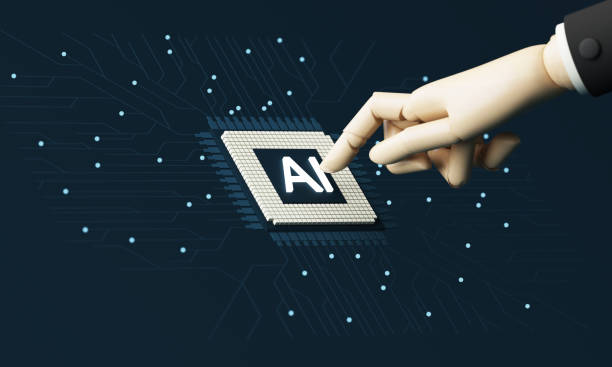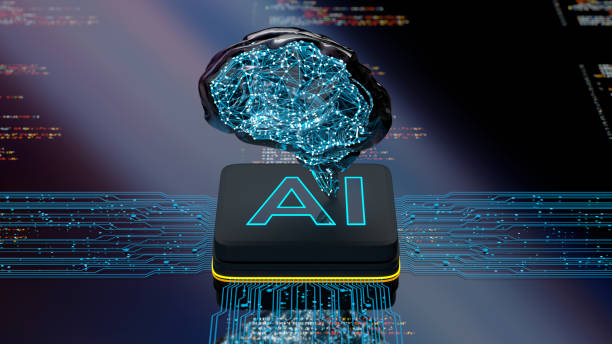What is Artificial Intelligence? Definition and Basic Concepts

Artificial intelligence (Artificial Intelligence or AI) is a branch of computer science that deals with the design and development of systems capable of performing tasks that usually require human intelligence.
These tasks include learning, reasoning, problem-solving, natural language understanding, pattern recognition, and decision-making.
In fact, the main goal of artificial intelligence is to create machines that can think and act independently.
To better understand artificial intelligence, it is important to be familiar with its basic concepts.
#Machine_learning is one of the main sub-branches of artificial intelligence that allows machines to learn from data and improve their performance without being explicitly programmed.
#Deep_learning is another approach to machine learning that uses artificial neural networks with multiple layers to analyze data.
Expert systems, robotics, and natural language processing (NLP) are other important areas in artificial intelligence.
Understanding these basic concepts helps us better understand the applications and potentials of artificial intelligence.
Artificial intelligence is currently used in various industries, from medicine and finance to transportation and manufacturing, and its role is expected to increase in the future.
Are you dissatisfied with the low conversion rate of visitors to customers on your online store?
Solve this problem forever by designing a professional online store with Rasaweb!
✅ Increase visitor-to-customer conversion rate
✅ Create an excellent user experience and gain customer trust
⚡ Get free consultation
History and Evolution of Artificial Intelligence

The history of artificial intelligence dates back to the 1950s, when scientists and researchers began to explore the possibility of building machines that could perform human-like tasks.
The Dartmouth Conference in 1956 is considered a turning point in the history of artificial intelligence, as the concept of artificial intelligence was formally introduced for the first time at this conference.
In the early decades, artificial intelligence was met with great enthusiasm, and it was predicted that machines would soon be able to solve complex problems and perform intelligent tasks.
However, due to hardware and software limitations, progress was slower than expected, and a period of disappointment known as the “AI winter” emerged.
In the following decades, with the advancement of technology and the increase in the processing power of computers, artificial intelligence regained attention.
The emergence of new machine learning algorithms, especially deep learning, revolutionized this field.
Today, artificial intelligence is present in many aspects of our lives, from voice assistants like Siri and Alexa to movie and music recommendation systems.
The evolution of artificial intelligence is ongoing, and we expect to see significant advances in this field in the future.
Applications of Artificial Intelligence in Various Industries

Artificial intelligence is widely used in various industries and has had a significant impact on the performance and efficiency of these industries.
In the healthcare industry, artificial intelligence is used for disease diagnosis, new drug development, and personalized medical care.
Artificial intelligence systems can analyze medical images such as MRI and CT scans and detect signs of disease with high accuracy.
In the financial industry, artificial intelligence is used to identify fraud, manage risk, and provide automated financial services to customers.
Machine learning algorithms can identify unusual patterns in financial transactions and prevent fraud.
In the transportation industry, artificial intelligence is used to develop self-driving cars, optimize routes, and improve traffic management.
Self-driving cars use sensors and artificial intelligence algorithms to understand their surroundings and make decisions about how to drive.
In addition, artificial intelligence has extensive applications in the manufacturing, retail, and energy industries, helping to improve efficiency, reduce costs, and increase profitability.
| Industry | Application of Artificial Intelligence |
|---|---|
| Healthcare | Disease Diagnosis, Drug Development |
| Finance | Fraud Detection, Risk Management |
| Transportation | Self-Driving Cars, Route Optimization |
Machine Learning and its Types

Machine learning is one of the most important sub-branches of artificial intelligence that allows machines to learn from data and improve their performance without being explicitly programmed.
There are different types of machine learning algorithms, each suitable for specific problems.
Supervised Learning is one of the most common types of machine learning in which the machine is trained using labeled data.
For example, to train an image recognition system, you can use labeled images, each with a label indicating what the image contains.
Unsupervised Learning is another type of machine learning in which the machine is trained using unlabeled data.
In this case, the machine must automatically discover patterns and structures in the data.
Reinforcement Learning is also a different approach in which the machine learns by trial and error how to act in a specific environment to earn more rewards.
Reinforcement learning algorithms are often used in games and robotics.
Choosing the right type of machine learning algorithm depends on the type of problem and the available data.
Did you know that your customers’ first impression of your company is your website? With a powerful corporate website from Rasaweb, multiply your business credibility!
✅ Exclusive and eye-catching design tailored to your brand
✅ Improve user experience and increase customer attraction
⚡ Get a free consultation!
Artificial Neural Networks and Deep Learning

Artificial Neural Networks (ANNs) are computational models inspired by the structure and function of the human brain.
These networks consist of processing units called neurons, which are organized in different layers.
Each neuron receives inputs from other neurons, applies a mathematical function to them, and sends the output to other neurons.
Deep Learning is a subset of machine learning that uses artificial neural networks with multiple layers (so-called deep networks) to analyze data.
Deep networks are capable of learning complex and abstract patterns in data and have shown excellent performance in many areas, including image recognition, natural language processing, and speech recognition.
One of the important features of deep learning is that it can automatically learn important features of data without the need for these features to be manually determined by humans.
This makes deep learning very suitable for solving complex problems that have high-dimensional data.
There are different architectures for deep neural networks, including Convolutional Neural Networks (CNNs), which are used for processing images and videos, and Recurrent Neural Networks (RNNs), which are used for processing sequential data such as text and speech.
The use of neural networks and deep learning has enabled artificial intelligence to achieve significant results in many fields.
Natural Language Processing (NLP) and its Applications
![]()
Natural Language Processing (Natural Language Processing or NLP) is a branch of artificial intelligence that deals with the interaction between computers and human languages.
The main goal of NLP is to enable computers to understand, interpret, and generate human language.
NLP has applications in many areas, including machine translation, sentiment analysis, text summarization, and question answering.
Machine translation allows computers to translate text from one language to another.
Sentiment analysis allows computers to detect the emotions in a text, such as positive, negative, or neutral.
Text summarization allows computers to generate a short summary of a long text.
Question answering allows computers to answer questions asked in natural language.
NLP uses various algorithms to analyze and process language, including machine learning algorithms, neural networks, and linguistic rules.
With the advancement of artificial intelligence and NLP, computers are expected to be increasingly able to interact with humans in natural language.
Challenges and Limitations of Artificial Intelligence

Despite the remarkable advances in the field of artificial intelligence, there are still significant challenges and limitations that need to be addressed.
One of the main challenges is the lack of training data.
Machine learning algorithms require a large amount of data to train, and in many cases, it is difficult to collect enough appropriate data.
Another challenge is the issue of bias in data.
If the training data is biased, machine learning algorithms will also be biased and provide incorrect results.
In addition, artificial intelligence is still limited in understanding and solving complex problems that require reasoning and creative thinking.
Artificial intelligence systems are often unable to generalize their knowledge to new situations and encounter problems in the face of unexpected conditions.
Also, the issue of ethics in artificial intelligence is very important.
It must be ensured that artificial intelligence systems operate fairly and without discrimination and respect the rights and privacy of individuals.
Given these challenges and limitations, more research needs to be done in the field of artificial intelligence to solve these problems and benefit from the full potential of this technology.
| Challenge | Description |
|---|---|
| Lack of Data | Need for a large amount of data for training |
| Bias in Data | Impact of data bias on results |
| Complex Issues | Limitation in understanding complex issues |
Ethical Issues in Artificial Intelligence

As artificial intelligence increasingly permeates our lives, the ethical issues associated with this technology become more important.
One of the main issues is accountability.
If an artificial intelligence system makes a decision that leads to harm, who will be responsible? Should the developers of the system, its users, or the system itself be held accountable? Another issue is transparency.
Many artificial intelligence algorithms, especially deep neural networks, are known as “black boxes” because it is difficult to understand how they make decisions.
This lack of transparency can lead to distrust of artificial intelligence systems.
Also, the issue of privacy is very important.
Artificial intelligence systems often require a large amount of personal data to function effectively, and this can lead to concerns about the misuse of this data.
To address these ethical issues, new laws and regulations need to be put in place to regulate the use of artificial intelligence and protect the rights and privacy of individuals.
Also, artificial intelligence developers should actively participate in solving these ethical issues and try to design systems that are fair, transparent, and accountable.
Expanding the application of artificial intelligence requires serious attention to the ethical issues associated with it.
Are you losing potential customers due to an unprofessional website? Rasaweb is your answer! With our specialized corporate website design services:
✅ Enhance your business credibility and position
✅ Experience attracting more targeted customers
⚡ Act now to receive a free consultation!
The Future of Artificial Intelligence and its Impact on Society

The future of artificial intelligence is bright and full of potential.
With the advancement of technology and the increase in the processing power of computers, we expect to see significant advances in this field.
Artificial intelligence can have a profound impact on society and improve our lives in many aspects.
In the future, we can expect artificial intelligence systems to play a more important role in various fields, including healthcare, education, transportation, and manufacturing.
For example, artificial intelligence systems can help doctors diagnose diseases, help students learn lessons, help drivers drive safely, and help factories produce quality products.
However, it should be noted that artificial intelligence can also create challenges for society.
For example, increasing the use of artificial intelligence can lead to job losses, as machines can automatically perform many of the tasks previously performed by humans.
To meet these challenges, governments, organizations, and individuals need to actively participate in planning for the future of artificial intelligence and try to use the potential of this technology for the benefit of society.
How to Learn Artificial Intelligence: A Beginner’s Guide

Learning artificial intelligence can be an exciting and challenging journey.
To get started, you can familiarize yourself with the basic concepts and key terms of artificial intelligence.
There are many online resources that you can use to learn these concepts, including online courses, articles, and books.
After familiarizing yourself with the basic concepts, you can start learning the programming languages used in artificial intelligence, such as Python.
Python is a powerful and flexible programming language that is widely used in artificial intelligence.
Also, you can familiarize yourself with artificial intelligence libraries and tools, such as TensorFlow, Keras, and PyTorch.
These tools help you quickly and easily create and train artificial intelligence models.
After learning these tools, you can start working on practical artificial intelligence projects.
Doing practical projects helps you apply your knowledge and improve your skills.
Also, you can participate in online artificial intelligence communities and connect with other enthusiasts in this field.
With effort and perseverance, you can learn artificial intelligence and succeed in this field.
Frequently Asked Questions
| Question | Answer |
|---|---|
| 1. What is Artificial Intelligence (AI)? | It is a branch of computer science that aims to create machines capable of simulating human intelligence and performing tasks that require human thinking, such as learning, problem-solving, and decision-making. |
| 2. What are the main types of artificial intelligence? | They can be classified into weak artificial intelligence (Narrow AI) that focuses on a specific task, general artificial intelligence (General AI) that possesses comprehensive human capabilities, and super artificial intelligence (Super AI) that surpasses human intelligence. |
| 3. Mention some common artificial intelligence applications in our daily lives. | They include voice assistants (such as Siri and Alexa), recommendation systems (such as Netflix and Amazon), self-driving cars, facial recognition systems, and spam filters. |
| 4. What is the difference between artificial intelligence and machine learning (Machine Learning)? | Artificial intelligence is the broader concept of creating intelligent machines, while machine learning is a subset of artificial intelligence that focuses on enabling systems to learn from data without explicit programming. |
| 5. What is Deep Learning? | It is a subset of machine learning that uses artificial neural networks with multiple layers (deep neural networks) to process data and discover complex patterns, and it is used in image and speech recognition. |
| 6. What are the most prominent benefits of artificial intelligence? | Improving efficiency and productivity, automating repetitive tasks, making better decisions based on big data analysis, and developing solutions to complex problems in fields such as medicine and science. |
| 7. What are the main challenges facing the development and deployment of artificial intelligence? | They include the need for massive amounts of high-quality data, privacy and security issues, bias in data and algorithms, and high development and maintenance costs. |
| 8. Does artificial intelligence raise ethical or social concerns? | Yes, it raises concerns related to privacy, algorithmic bias, job loss due to automation, and responsibility for errors committed by intelligent systems, and the need for a regulatory framework. |
| 9. How can artificial intelligence affect the future of the labor market? | It can lead to the automation of some routine jobs, but it will also create new jobs that require advanced skills in developing, operating, and maintaining artificial intelligence systems. |
| 10. What are some modern or promising technologies in the field of artificial intelligence? | They include advanced Natural Language Processing (NLP) (such as large language models like ChatGPT), computer vision, robotics, and Generative AI. |
And other advertising services of Rasa Web Advertising Agency
Intelligent Linking: A novel service to increase customer behavior analysis through precise audience targeting.
Intelligent Reporting: A combination of creativity and technology for online growth through dedicated programming.
Intelligent Sales Automation: A combination of creativity and technology for user interaction by optimizing key pages.
Intelligent SEO: A combination of creativity and technology for online growth through Google Ads management.
Intelligent Digital Branding: A fast and efficient solution to increase sales with a focus on intelligent data analysis.
And hundreds of other services in the field of internet advertising, advertising consulting, and organizational solutions
Internet Advertising | Advertising Strategy | Advertorial Report
Sources
What is Artificial Intelligence? Everything about Artificial Intelligence
,What is Artificial Intelligence?
,What is Artificial Intelligence? History and Types
,What is Artificial Intelligence? | What are the features of Artificial Intelligence?
? To reach the peaks of success in the digital world, Rasaweb Afarin Digital Marketing Agency, with expertise in SEO, content production, and user-friendly website design, paves the way for the growth of your business.
📍 Tehran, Mirdamad Street, next to the Central Bank, South Kazerun Alley, Ramin Alley No. 6



